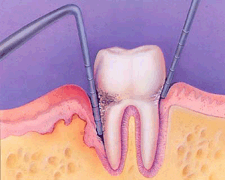المقالات
Heart Disease

Researchers have discovered that you may be at increased risk of developing coronary heart disease and stroke if you suffer from periodontal disease.
Some research has linked the bacteria associated with periodontal disease to the formation of blood clots that can block your arteries and even trigger a heart attack. These clots also cause fat-like substances to build up in the carotid arteries in your neck. If these fat deposits break apart and are carried away in your bloodstream, they can lodge in your brain, block a blood vessel, and cause a stroke.
Additionally, some studies have also shown that when bacteria enter the bloodstream through infected gums in people with certain kinds of heart problems, they can cause a heart condition called infective endocarditis. This is a potentially fatal bacterial infection that causes the sac around the heart to become inflamed.
As you can see, it's vital to your overall health, as well as your oral health, to keep your gums healthy. If we determine that you have periodontal disease, we'll suggest therapies specific to your condition, have you in for more frequent professional cleanings, and work with you to create a suitable at-home oral hygiene routine.
Periodontal disease, also called gum disease, is an infection of the teeth, gums, and the ligaments and bone that surround your teeth. Gums infected with periodontal disease are toxic reservoirs of disease-causing bacteria. The bacteria accumulate on the root surfaces of your teeth, causing pockets of infection to form. The bacteria multiply in these pockets, resulting in tender, red, swollen gums that bleed when you brush or floss.
Bleeding gums can create an opening that allows harmful bacteria in your mouth to enter your bloodstream. Severe periodontal disease can be compared to a nine-square-inch open wound around your teeth, offering plenty of opportunities for harmful bacteria to enter your blood.
